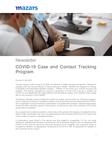
COVID-19 Case and Contact Tracking Program
The decree indicated a series of definitions within the system, among which are "Selective Isolation", as the measure consisting of mandatory isolation to be observed by persons diagnosed with COVID-19 or suspected of having it and their symptomatic or asymptomatic contacts, if deemed appropriate, during the entire infectious period of each person, as well as the rest of the members of the family group and/or cohabitants.
As a complement to selective isolation, and to reduce the spread of the disease, the departmental or district health secretariats may carry out epidemiological encirclements when there are clusters with a high number of cases in a geographical area.
A controversial issue raised in this decree was that related to incapacities. On the one hand, “Minsalud” indicated that members contributing to the Contributive Regime who are diagnosed with COVID-19 will have the economic resources derived from the disability due to general illness or occupational disease, as appropriate, recognized by the EPS or ARL to guarantee the isolation of them and their family nucleus.
However, on the other hand, it indicated that the affiliates contributing to the Contributive Regime who are diagnosed with COVID-19 and for whom the treating physician considers that it is not necessary to generate a disability due to the physical conditions in which they are, will be prioritized to perform telework or work at home, during the term of the mandatory isolation.
Expressed this, and according to the Ministry, the fact that a person has coronavirus per se, is not a reason for the doctor to issue a disability and consequently, by not issuing the same, leaves the burden to the employer to assume the payment of the isolation since, even if the worker has favorable physical conditions or is part of the so-called "asymptomatic", his diagnosis is positive for COVID and therefore must comply with the isolation. Although the same Ministry mentions that the workers will be prioritized to work at home or telework, it forgets that, in Colombia, most of the jobs cannot be performed through these figures and therefore it will not be possible to benefit from these while the worker complies with the fifteen (15) days of isolation without rendering services to the company and without having a disability duly issued by his doctor.
On the other hand, and regarding the affiliates to the Subsidized Health Regime who are diagnosed with COVID-19, it was indicated that they will have the payment of the Temporary Economic Compensation, created by article 14 of Legislative Decree 538 of 2020, which corresponds to seven (7) days of the Minimum Legal Daily Wage in Force - SMLDV for one time and per family nucleus, as long as the isolation measure has been complied with.
For the conformation of the family group with a view to the recognition of the Temporary Economic Compensation, ADRES [1] will use the information from the Identification System of Potential Beneficiaries of Social Programs - Sisbén and other official sources and will compile and organize the information for the use and disposal of all entities involved in the framework of the PRASS strategy.
For the payment of Temporary Economic Compensation, the Health Promoting Entities must:
- Verify that the beneficiary of the compensation and his/her family group have committed to comply with the mandatory isolation measure.
- Provide the information required by ADRES for the payment of the compensation.
- Authorize ADRES the direct transfer of the Temporary Economic Compensation to the beneficiaries, under the terms and conditions defined by said entity.
This administrator will validate the information reported by the EPS and will verify that the beneficiary is alive, that he/she is affiliated to the Subsidized Regime and that the Temporary Economic Compensation has not been paid to the same affiliate or to any member of his/her family group, all of which, based on the available official information systems.
Finally, if the affiliate diagnosed with COVID-19 dies during the isolation period, the Health Promoting Entity shall inform this situation to ADRES so that the latter may proceed with the recognition of the Temporary Economic Compensation to the family nucleus if it was not previously recognized.
[1] ADRES - Administradora de los Recursos del Sistema General de Seguridad Social en Salud.


